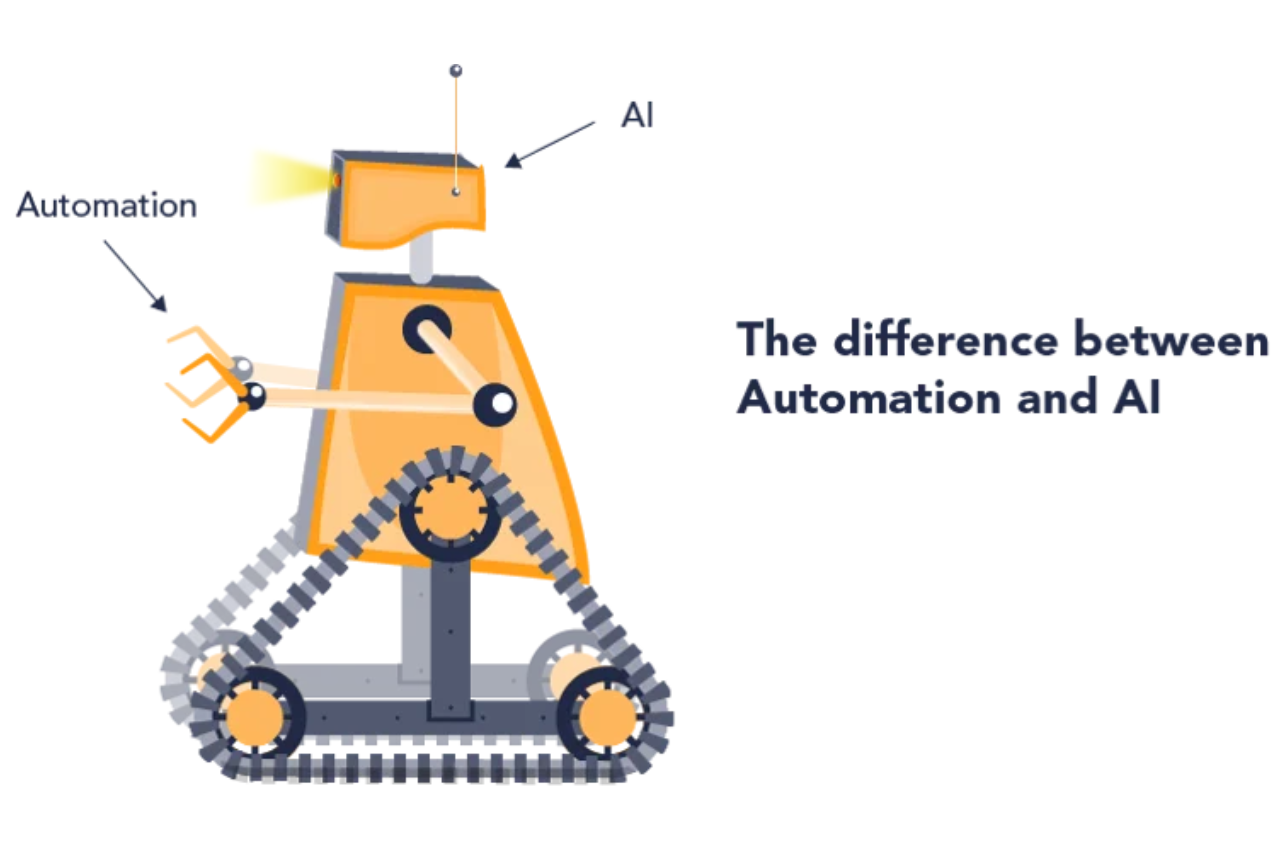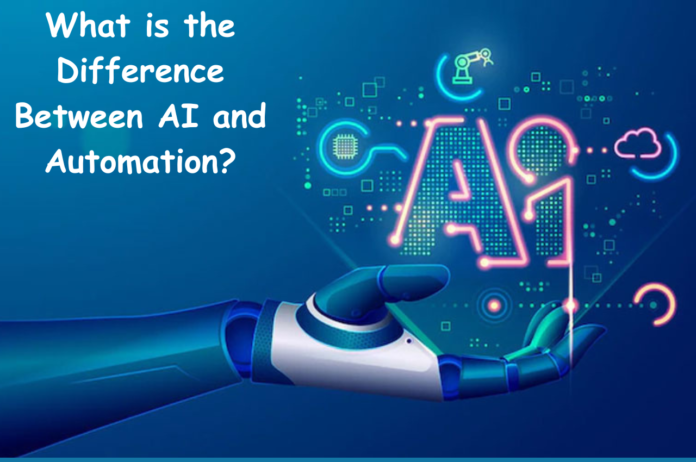The emergence of artificial intelligence stands as a monumental achievement in our era. What was once a mere aspiration has now become the destiny of humanity. Over the course of several decades, AI has seamlessly integrated itself into various facets of our daily lives, encompassing our smartphones, automobiles, shopping habits, and even our musical preferences. Today’s topic of discussion at Technocommy, What is the difference between AI and Automation? So let’s get started-
Thank you for reading this post, don't forget to subscribe!What is Artificial Intelligence?
Artificial Intelligence, also known as AI, is the field of study focused on creating machines capable of solving complex problems and performing tasks that surpass the capabilities of the human brain. The ultimate goal of AI is to develop machines that possess human-like thinking abilities, truly embodying the concept of intelligent beings. Contrary to being a mere product of science fiction, AI is a legitimate scientific discipline rooted in the idea of intelligent machines. Some examples of AI are pilotless planes, driverless cars and robots performing various tasks, AI has become popular in movies, there are many more examples of artificial intelligence that we encounter in our daily lives without even realizing it. Our everyday use of computers, satellite TV, smartphones, and even gaming consoles are all manifestations of AI at work, often unbeknownst to us.
What is Automation?
Automation, also known as mechanization, refers to the utilization of technology to streamline processes with minimal or no human involvement. The essence of automation lies in enabling machines to carry out repetitive tasks automatically and efficiently. Although automation is not a novel concept, the recent advancements have bestowed machines with boundless capabilities to achieve automation. These machines possess the capacity to perform tasks that would otherwise be arduous or unfeasible for humans. Automation has permeated every aspect of our lives, manifesting in various forms such as mobile payment applications, thermostats, coffee makers, ATMs, automated parking systems, assembly lines, online shopping platforms, and countless others. Despite its omnipresence, automation often remains inconspicuous. Automated systems can generally be categorized into fixed automation and programmable automation.
Difference between AI and Automation
The field of technology is in a constant state of evolution, and two terms that frequently intersect are Artificial Intelligence (AI) and automation. Despite their apparent similarities, there are significant distinctions between AI and automation.
AI pertains to the creation of computer systems that can carry out tasks typically requiring human intelligence, such as decision-making, pattern recognition, and problem-solving. By imitating human intelligence, AI enables machines to learn from experiences and adapt to new information. On the other hand, automation involves the utilization of technology to streamline and simplify repetitive tasks, often without involving complex decision-making processes. Automation often relies on predefined rules or instructions, enabling machines to perform tasks with greater speed and accuracy compared to manual efforts. While both AI and automation have the potential to enhance efficiency and productivity across various industries, they serve different purposes in the realm of technology. Automation primarily focuses on simplifying repetitive tasks and minimizing human involvement, whereas AI aims to replicate human cognition and extend machine capabilities beyond simple rule-based tasks. Recognizing these distinctions is crucial for harnessing the full potential of both AI and automation in modern applications. In this section, we will discuss the key differences between AI and Automation-
While both AI and automation have the potential to enhance efficiency and productivity across various industries, they serve different purposes in the realm of technology. Automation primarily focuses on simplifying repetitive tasks and minimizing human involvement, whereas AI aims to replicate human cognition and extend machine capabilities beyond simple rule-based tasks. Recognizing these distinctions is crucial for harnessing the full potential of both AI and automation in modern applications. In this section, we will discuss the key differences between AI and Automation-
Terminology
The terms artificial intelligence (AI) and automation are often used interchangeably, but they have distinct meanings. AI involves creating machines that can solve complex problems and perform tasks that are too difficult for the human brain to handle alone. On the other hand, automation refers to the use of technology to streamline processes with minimal or no human intervention. Automation enables machines to perform tasks that would be challenging or impossible for humans, while AI simulates human intelligence.
Objective
AI focuses on developing highly intelligent machines that exhibit behaviors and thinking that are typically associated with human intelligence. It aims to make machines capable of thinking, behaving, and learning like humans. Automation, on the other hand, aims to simplify and expedite repetitive tasks to enhance productivity and efficiency, often with minimal human involvement.
Examples
Examples of AI include ride-sharing apps like Uber and Lyft, speech recognition, problem-solving, machine learning, smart email categorization, spam filters, Amazon Alexa devices, Chatbots, Apple’s Siri, Google Now, Internet of Things, Google Predictive searching, product recommendations, and more. On the other hand, examples of automation include form auto-filling, customer support, digital signatures, automatic assembly, employee analytics, online banking, payment processing, numerical control machines, material handling robots, highway systems, automated waste management, automated retail, video surveillance, and so on. A common example of an automated system is a thermostat used in household appliances.
How AI and Automation work Together in Business
AI and automation have the potential to complement each other effectively within the business environment. While automation is designed to streamline routine processes, AI is focused on handling tasks that require complex decision-making. When integrated, these two technologies can give rise to Intelligent Automation, which combines the efficiency of automation with the cognitive abilities of AI. There are multiple ways in which AI and automation can work together to enhance business operations:
- Streamlining Operations: By automating repetitive tasks, businesses can save valuable time and resources. AI can further enhance this process by optimizing algorithms to improve efficiency and reduce errors.
- Enhancing Customer Experience: AI has the capability to analyze customer data, enabling businesses to provide personalized services and recommendations. Automation can be utilized to promptly respond to customer inquiries, resulting in seamless interactions.
- Improved Decision-Making: Through data analysis, AI can make accurate predictions. When combined with automation algorithms, these predictions can contribute to better decision-making across various departments within a business.
More Info: Implement AI and Automation in Your Business
In conclusion, the integration of AI and automation offers numerous opportunities for businesses to thrive and maintain competitiveness in the ever-evolving technological landscape.
Summary of Artificial Intelligence vs. Automation
When considering the impact of technology on our lives, it is evident that automation and artificial intelligence have revolutionized various aspects. These technologies have not only become the dominant form of intelligence but have also seamlessly integrated into our surroundings. It is undeniable that AI has evolved from being a mere daily assistant to a powerful force, surpassing human capabilities in numerous fields. Technology is all about pushing boundaries and this is precisely what AI and automation aim to achieve – exploring new possibilities to surpass human intelligence. However, it is important to note that AI focuses on enhancing machine intelligence and behavior to surpass humans, while automation aims to streamline and expedite processes without human involvement.


